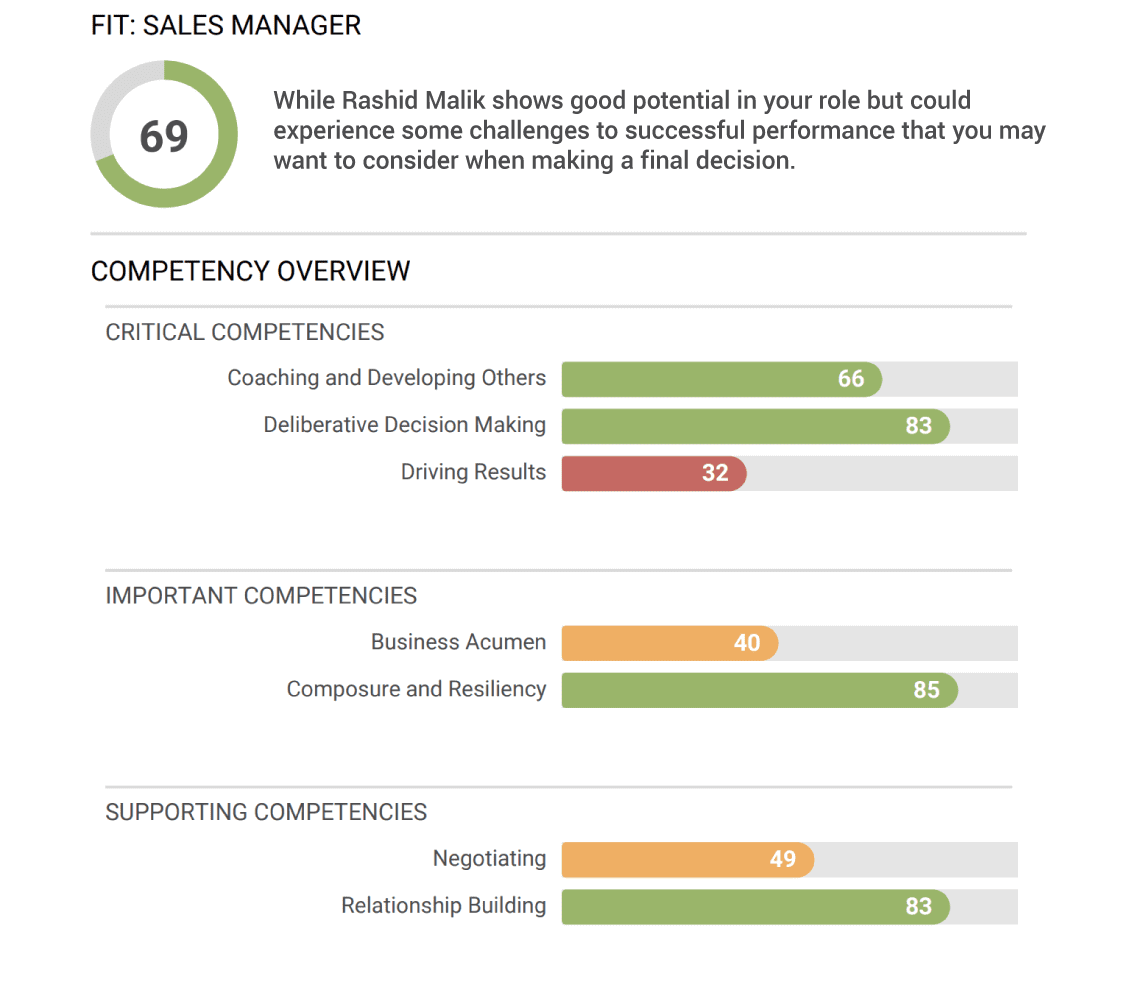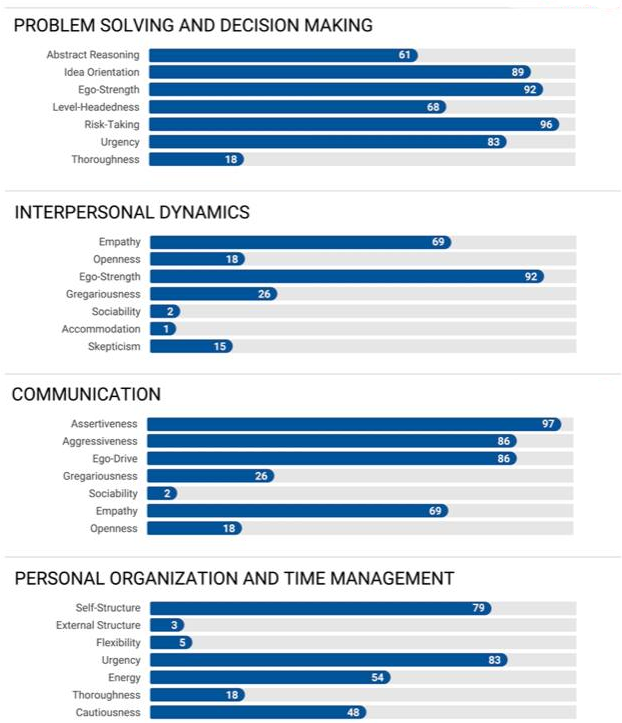
What is the Talogy Caliper?
The Caliper Assessment, also known as the Caliper Profile (now called Talogy Caliper), is a scientifically validated tool used by organizations to evaluate personality traits, cognitive abilities, and potential for workplace success. It measures key attributes such as problem-solving, interpersonal skills, and motivation, alongside reasoning abilities like numerical and abstract reasoning. Unlike traditional tests, it’s not pass-or-fail but focuses on how well a candidate’s natural tendencies align with a specific role. The assessment is used for hiring, leadership development, and team-building.
Here, we will cover what you need to know about the Caliper Profile.
At Aptitude-test.com we offer comprehensive practice materials for the Caliper Profile (Talogy Caliper).
Caliper Assessment, Caliper Profile or Talogy Caliper?
The present official name for the test is Talogy Caliper. But it has previously been known as the Caliper Profile, and is often referred to as the Caliper Assessment. It is not uncommon to see the test still branded as the Caliper Profile.
What questions can I expect on the Talogy Caliper?
As mentioned, the Talogy Caliper evaluates both personality traits and cognitive abilities.
Let us first look at the cognitive ability section of the Caliper assessment.
Cognitive ability section
The cognitive ability section of the Talogy Caliper (formerly Caliper Profile) assessment evaluates a candidate’s problem-solving and critical thinking skills, focusing on how effectively they can process and analyze information. This part of the assessment is designed to measure cognitive skills that are crucial for workplace success, particularly in roles requiring logical reasoning, decision-making, and adaptability.
The cognitive ability section includes four types of questions: Number series, image matrices, image series, and image analogies.
We will cover these four question types below.
Number Series
You are given a series of numbers with one or more numbers missing within or at the end of the series. You must complete the series by adding the missing number(s).
To do this, you must identify the rule applied in the series. This rule is normally of a mathematical nature.
Number Series example question:
Find the missing numbers:
2, ?, ?, 8, 10, 12
Explanation:
Select your answer to display explanation.
In this series, the number is increased by 2 with every step.
Image Matrices
In image matrices, you will be presented with a matrix of 3 rows and 3 columns, containing 8 items and one missing. Your task is to identify the pattern, rule, or association among the items in the matrix to determine the missing item.
Image Matrices example question:
Select a suitable option that would complete the figure matrix.
Explanation: Select your answer to display explanation.
With each step along the row, an additional radial line is added to the polar grid.
Note: A radial line is a line that extends from the center of the grid to the outer edge.
With each step along the column, an additional circle is added to the polar grid.
Image Series
An image series question typically presents a series of figures, shapes, numbers, or letters, and asks you to identify the underlying pattern or rule. Based on this pattern, you are asked to choose the next item in the series.
Image Series example question:
Select a suitable option that would complete the series.
Explanation: Select your answer to display explanation.
With each step in the series, the circle becomes slightly larger, while the rectangle becomes slightly smaller.
Image Analogies
In a typical image analogy question, you are presented with a set of images where the first two are related in a certain way. Your task is to determine how they are related and then find a similar relationship in another set of images, one of which is usually missing. You have to select the missing image from a number of options that completes the analogy in the same way as the first pair.
For instance, you might see a pattern that enlarges from the first to the second image. The task would be to find a pattern from the options provided that enlarges in the same way from a third given image.
Image Analogy example question:
Explanation: Select your answer to display explanation.
The figure on the right is the same as the figure on the left, only rotated 90 degrees counterclockwise.
We have included practice questions of every type in our Caliper Test Prep Package.
Personality section
The personality section of the Talogy Caliper assessment evaluates an individual’s behavioral traits, motivations, and tendencies to understand how they align with workplace roles and environments. This section is not about measuring “right” or “wrong” answers; instead, it provides a detailed profile of a person’s natural inclinations, helping employers predict job performance, cultural fit, and development potential.
The personality section includes two types of personality items: Rating style and Most/Least style
Rating style
The likert scale rating-style questions are designed to gauge a candidate’s personality traits by asking them to evaluate statements based on their agreement or preference. These questions typically present a series of workplace-relevant statements or scenarios and ask candidates to rate how much they agree or identify with them.
Rating Style example question:
I enjoy solving complex problems and finding creative solutions.
There is no correct or incorrect answer to this question. The right answer for you is the honest one.
Most/Least style
The forced-choice (most/least) type questions on the Talogy Caliper Assessment are designed to assess personality traits by requiring candidates to make decisions about which statements best or least reflect their preferences or behaviors. These questions present several options, often all positive or neutral, and ask candidates to rank or choose between them, revealing deeper insights into their natural tendencies.
Most/Least example question:
From the list of four statements, select the one that is most like you and the one that is least like you.
| Statement | Most | Least |
|---|---|---|
| I prefer stepping in to clarify roles and responsibilities when team projects become disorganized. | ||
| I double-check data and reports to ensure there are no errors before submitting them. | ||
| I enjoy brainstorming unconventional solutions for tasks that don’t have a clear process. | ||
| I actively seek opportunities to connect with colleagues on both work and personal topics. |
There is no correct or incorrect answer to this question. The right answer for you is the honest one.
How is my score calculated?
The Talogy Caliper Profile measures 21 personality traits and one cognitive ability, with each trait scored as a percentile. This shows how your traits compare to a group of professionals in similar roles. For example, a score at the 50th percentile means your level is average compared to others.
These scores are used to predict workplace behaviors, which are grouped into key skills, or competencies, needed for a job. Each role has a specific Job Model made up of 5 to 9 key competencies. Your alignment with these determines your Job-Fit Score, which ranges from 1 to 99. A higher score means your traits align more closely with what the role requires.
Caliper Profile Job-Fit Scores
The critical, important, and supporting competencies will vary depending on the job position.

Caliper Profile Results Sheet
This is a list of some of the traits evaluated with the Talogy Caliper assessment.

When you take the Caliper assessment, your results are compared to a norm group, meaning your performance is evaluated relative to how others perform on the assessment. The results provide an overview of your behavioral traits and cognitive abilities, highlighting your strengths, weaknesses, motivators, and stressors.
Scores are categorized into three ranges on a scale of 1–99:
- 60 – 99: Natural fit. This indicates you are a natural fit for the position, showing high compatibility with the role’s requirements.
- 40 – 59: Moderate alignment. You demonstrate some level of competency but may show inconsistencies. Additional training or support could be needed to excel in the role.
- 1 – 39: Weakalignment. Your traits and abilities may not strongly match the demands of the role, suggesting it might not be the best fit.
This system helps employers make informed decisions while providing you with valuable insights into your professional strengths and areas for improvement.
The seven competency areas
The Talogy Caliper evaluates individuals across seven key competency areas:
- Leadership:
The ability to inspire, guide, and motivate others toward achieving goals. - Active Communication:
Effectively sharing ideas, listening actively, and ensuring clear information exchange. - Interpersonal Dynamics
Building strong relationships, fostering collaboration, and resolving conflicts. - Decision Making:
Evaluating options, assessing risks, and making timely, informed choices. - Problem Solving:
Identifying issues, analyzing causes, and developing effective solutions. - Process Management:
Organizing tasks, optimizing workflows, and ensuring consistent execution. - Self-Management:
Demonstrating personal accountability, resilience, and adaptability to challenges.
After completing our Simulated Caliper Assessment you will be given a scores sheet detailing your seven competency areas. The Simulated Caliper Assessment is part of the Caliper Test Preparation Account.
How to prepare for the Caliper assessment
The results of your Caliper assessment plays a large role in how the employer views you as a candidate. Preparing for the Talogy Caliper assessment can help align your results better with the requirements of the employer.
Here are some tips on how to prepare for your Caliper test.
- Familiarize Yourself: Learn about the structure of the Caliper to ensure you approach it confidently.
- Practice Questions: Practice questions similar to the cognitive ability section. The most significant boost to your score potential will come from practicing for this section.
- Simulated Test: Set up a simulated test with the same question types and layout of the test, to try how to is to sit the real test.
Tips for taking the Caliper assessment
- Time Management: You are not rated on the time taken to complete the Caliper Assessment Test. The test is untimed, allowing you to work through questions at your own pace. Taking your time can be beneficial, especially for the cognitive sections, as it allows you to approach each question thoughtfully. However, if you spend too long on each question, you may become mentally exhausted before reaching the end.
- Stay Calm: Test anxiety can affect your performance. Try to remain calm and focused during the test. Familiarity with the test format can help reduce anxiety, so completing this preparation course can be beneficial.
- Read Questions and Answers Carefully: Make sure you read each question and the answer options carefully before selecting an answer. Misreading or misunderstanding a question is a common cause of incorrect answers.
- Be Honest: In the personality section, honesty and consistency are key. Remember, there are no right or wrong answers here—it’s about gaining insight into your personality and how it aligns with the job role.
- Answer All Questions: There is no penalty for incorrect answers, so it is better to guess and move on than to skip questions.
Preparation makes the difference
We can help you prepare for the Talogy Caliper (Caliper Profile). With our Caliper Test Prep Package, you get more than 400 Caliper cognitive ability practice questions with explained solutions, 114 personality items, a simulated Caliper assessment, and guidance throughout your training. Get access now.
Try our free Caliper assessment, we’ve included each of the cognitive ability question types covered above.
Free Caliper assessment test.
Try a free Talogy Caliper practice test.
This free practice test contains 8 test questions and has no time limit.
Aptitude-test.com is not affiliated with Talogy or Caliper Corp. Talogy, Caliper and other trademarks are the property of their respective trademark holders.
Caliper Test Prep
Test preparation materials specifically designed for the Talogy Caliper assessment (Caliper Profile).
Only $29
6 months access
What you get
- 33 Caliper practice tests
- 400 cognitive ability questions
- 114 personality items
- Simulated Caliper assessment
- Access 24/7 from all your devices.
- Progress reports & final report
- Charts and statistics.
- Compare your performance
- Friendly customer service.
Recruiting?
Discover how to make smart hiring decisions.
Unlock Your Potential
Improve your performance with our test preparation platform.
- Access 24/7 from all your devices.
- 33 Caliper practice tests
- 400 cognitive practice questions
- 114 personality items
- Simuated Caliper Assessment
- Solutions explained in detail.
- Progress reports & final report
- Keep track of your performance with charts and statistics.
- Compare your performance against others
- Friendly customer service.
